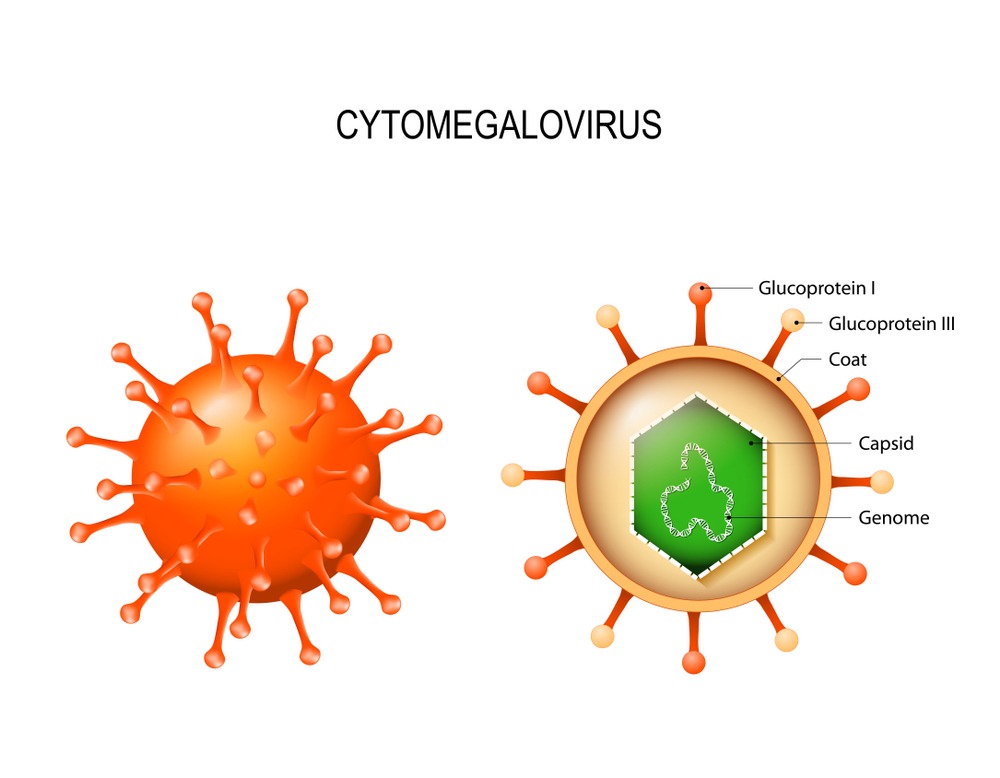Cytomegalovirus
CMV:
Cytomegalovirus (CMV) is a widespread virus that belongs to the herpesvirus family.It can infect people of all ages and is particularly common in newborns, pregnant women and people with weakened immune systems. In this article, we delve into the details of cytomegalovirus and examine its causes, symptoms, transmission, and possible complications.
What is CMV?
CMV is a common virus that infects nearly 50-60% of adults over 40 in the United States.It is characterized by the ability to build up a permanent latency, to lie dormant in the organism and to reactivate periodically.CMV can attack various organs and systems, including the lungs, liver, eyes and nervous system.

Causes of Cytomegalovirus:
- The main cause of CMV infection is direct contact with body fluids such as saliva, urine, blood or vaginal secretions from an infected person.
- Infection can occur through close personal contact, sharing kitchen utensils, sexual activity, or blood transfusions.
- Pregnant women can also transmit the virus to the fetus through the placenta or during birth.
Cytomegalovirus symptoms:
- Many people infected with CMV may have no symptoms, but others may have mild flu-like symptoms such as fever, fatigue and muscle aches.
- In people with weakened immune systems, CMV can cause more serious symptoms, including pneumonia, hepatitis and encephalitis.
- Infants infected with CMV may experience symptoms such as hearing loss, visual impairment, intellectual disability, and developmental delays.
Diagnosis and Treatment
- Laboratory tests such as blood or urine tests can help diagnose cytomegalovirus infection by detecting the presence of the virus or its antibodies.
Prevention of cytomegalovirus
- Good hygiene, especially thorough handwashing, can help reduce the risk of CMV transmission.
- Close contact with CMV-infected people must be avoided at all costs, especially during pregnancy or if the immune system is weakened.
- Pregnant women should discuss CMV testing options with their doctor to assess the risk of transmitting the virus to the fetus.
Possible complications:
- Although most healthy people experience mild or no symptoms, cytomegalovirus can cause serious complications in some populations.
- In immunocompromised people, such as In some cases, such as organ transplant recipients or people infected with HIV/AIDS, CMV can cause organ damage, pneumonia, and even death.
- Newborns infected with CMV during pregnancy can have long-term consequences including hearing loss, vision problems and developmental problems.
CMV Symptoms:
CMV is a widespread virus that affects individuals of all ages.. Although many people infected with CMV have no visible symptoms, others may experience a variety of symptoms that indicate an active infection. Understanding the symptoms associated with CMV is critical for timely diagnosis and appropriate treatment. In this article, we examine the range of cytomegalovirus symptoms that individuals may experience and the importance of seeking medical attention if these symptoms occur.
Flu-like Symptoms:
- Fever: Mild or moderate fever, usually above 38 degrees Celsius, can last for several days.
- Headache: Mild to severe headaches can occur as the body reacts to an infection.
- Muscle and joint pain: The inflammation caused by the virus can lead to discomfort and pain in the muscles and joints.
- Sweating: Heavy sweating, especially at night, can be the result of the body’s attempt to fight an infection.
- Chills: It is not uncommon to experience a sudden cold and subsequent chills during a CMV infection.
gastrointestinal symptoms:
In addition to flu-like symptoms, CMV patients may experience gastrointestinal problems such as:
- Nausea and vomiting: Some people may occasionally experience nausea and vomiting.
- Diarrhea: CMV can cause inflammation of the digestive system, leading to loose stools and more frequent bowel movements.
- Abdominal pain: Discomfort and cramps may occur in the abdominal area, ranging in intensity from mild to severe.
Visual disturbances:
In rarer cases, CMV infection can affect the eyes and cause vision problems or eye symptoms including:
- Blurred Vision: The virus can cause temporary blurred vision, making it difficult to see clearly.
- Eye Pain: Some people may experience eye pain that can range from mild irritation to severe discomfort.
- Floaters: Small spots or dots may appear in a person’s field of vision that move and shift with eye movement.
Neurological symptoms:
CMV can also affect the central nervous system, causing a range of neurological symptoms including:
- Seizures: In severe cases, CMV infection can trigger seizures, leading to uncontrolled movements and loss of consciousness.
- Cognitive difficulties: Some people may have memory problems, difficulty concentrating or cognitive decline.
- Coordination problems: CMV can affect motor skills and cause clumsiness, unsteadiness and difficulty with coordination.
- Sensory disorders: Sensations such as tingling, numbness or burning may occur, which indicate nerve damage.
Other possible symptoms:
In addition to the symptoms mentioned above, CMV infection can sometimes manifest itself with other, less common symptoms, such as:
- Sore throat: Some individuals may experience throat discomfort, soreness, or irritation.
- Lymph node swelling: Enlarged and tender lymph nodes may be present, particularly in the neck, armpits, or groin area.
- Shortness of breath: CMV can cause inflammation in the lungs, leading to breathing difficulties and shortness of breath.
CMV Infection:
A typical viral infection brought on by cytomegalovirus is called cytomegalovirus (CMV) infection. This virus belongs to the herpesvirus family and can infect people of all ages. CMV infections can cause different symptoms depending on the person’s immune system and overall health. Here are some important points about CMV infection:
- Transmission: CMV is usually transmitted through close contact with an infected person’s body fluids, such as saliva, urine, blood and breast milk. It can also be transmitted through organ transplantation, blood transfusion or sexual contact.
- Symptoms: Many people infected with CMV have no or only mild flu-like symptoms, so they may not even realize they are infected. However, CMV can cause more serious symptoms in people with weakened immune systems, such as those infected with HIV/AIDS, organ transplant recipients, or infants infected at birth.
- Congenital CMV: If a pregnant woman becomes infected with CMV, the virus can be transmitted to the developing fetus, resulting in congenital CMV infection, which can lead to developmental and health problems in the newborn.
- Diagnosis: CMV infection can be diagnosed through several methods, including blood tests, urine tests, and molecular tests that detect the virus’s genetic material.
- Treatment: In healthy people, a CMV infection often goes away on its own without treatment.However, in more severe cases or in people with weakened immune systems, antiviral medications such as ganciclovir or vagonciclovir may be prescribed.
- Prevention: Preventing CMV infection includes good hygiene, including frequent handwashing, avoiding close contact with infected people, and using precautions such as condoms to reduce the risk of sexual transmission. Infection control measures are essential in healthcare settings to prevent the spread of CMV.
- Vaccinations: As of my last knowledge update in September 2021, there were no generally available vaccines against CMV. However, research on CMV vaccines continues.
Note:
Please note that information about CMV infections and possible solutions, such as: B. vaccines, may have changed since my last knowledge update in 2021. If you have concerns about CMV infection, it is recommended that you consult your doctor for more information. current information and advice.
CMV Pregnancy:
Infection with cytomegalovirus (CMV) during pregnancy is a concern because the virus can potentially be transmitted from the mother to the developing fetus and cause the congenital CMV infection I talked about in the previous answer. Here you can find more information about CMV infection during pregnancy:

- Transmission: Pregnant women can become infected with CMV through close contact with people who shed the virus through body fluids such as saliva, urine and blood. CMV can also be transmitted sexually. Once a pregnant woman becomes infected, the virus can potentially cross the placenta and infect the developing fetus.
- Risk Factors: The risk of CMV transmission to the fetus is greater if the mother is exposed to the virus for the first time during pregnancy, especially in the first trimester (primary infection).However, women with an existing CMV infection can also transmit the virus to their babies during pregnancy, although the risk is lower.
- Maternal Symptoms: In many cases, CMV infection in pregnant women does not cause any visible symptoms or the symptoms may be mild and flu-like. Some women’s don’t even know they are infected.
- Risk to the Fetus: Consequences of fetal CMV infection may include no visible symptoms or serious health problems, including hearing loss, developmental delays, intellectual disability, vision problems, and neurological complications. The severity of infection in the fetus may be influenced by the duration of maternal infection and other factors.
- Diagnosis and Monitoring: If there is concern about CMV infection during pregnancy, health care providers may perform diagnostic tests on both the mother and the developing fetus to determine whether CMV is present. Regular prenatal care and monitoring may be recommended for women at risk of CMV infection during pregnancy or who have been diagnosed with CMV infection.
- Prevention: Preventing CMV infection during pregnancy includes practicing good hygiene such as washing hands frequently, avoiding close contact with bodily fluids of young children, and using precautions such as condoms during pregnancy or during sexual activity. Pregnant women who work in healthcare or child care should take special precautions to reduce the risk of CMV exposure.
Note:
It is important for pregnant women to discuss any concerns about CMV infection with their healthcare provider as they can provide appropriate guidance, advice and testing.Early diagnosis and appropriate treatment can help minimize the risk of CMV transmission to the fetus and mitigate possible complications.
Congenital CMV:
Congenital cytomegalovirus (CMV) infection is a cytomegalovirus infection that occurs in the developing fetus during pregnancy. CMV is a virus that can infect people of all ages. However, if infected by a pregnant woman, the virus can be transmitted to the developing baby, resulting in congenital CMV infection. Here are some important points about congenital CMV infection:
- Transmission: Congenital CMV infection usually occurs when a pregnant woman is exposed to the virus for the first time (primary infection) or when she experiences reactivation of a previous CMV infection during pregnancy. The virus can be transmitted to the developing fetus through the placenta.
- Symptoms: A congenital CMV infection can have a variety of effects.Some babies may be born without any visible symptoms, while others may suffer from a variety of health problems. Common symptoms and complications can include hearing loss, developmental delays, intellectual disability, vision problems, seizures and other neurological problems.
- Diagnosis: Congenital CMV infection can be diagnosed using several methods, including amniocentesis (taking a sample of amniotic fluid), blood tests, and urinalysis. If it is suspected that the fetus was exposed to CMV during pregnancy, diagnostic tests may be performed.
- Prevention: Prevention of congenital CMV infection requires good hygiene and taking precautions to reduce the risk of CMV exposure during pregnancy.This includes washing hands frequently, avoiding close contact with small children’s saliva and urine, and using condoms during sexual activity to reduce the risk of CMV transmission.
- Treatment: There is no specific antiviral treatment for congenital CMV infection. However, children born with the infection may receive supportive care and interventions to treat specific symptoms and complications. Early diagnosis and intervention can improve outcomes for affected newborns.
- Vaccinations: At the time of my last knowledge update in September 2021, there were no widely available vaccines against CMV, including a vaccine specifically designed to prevent congenital CMV infection.However, research on CMV vaccines continues.
Note:
Please note that information about congenital CMV infections and possible solutions, such as vaccines or treatment options, may have changed since my last knowledge update. If you have concerns about congenital CMV infection during pregnancy or suspect that your baby may be infected, be sure to consult your doctor for the most up-to-date information and advice.
CMV Negative:
The term “CMV-negative” or “CMV-NEG” generally refers to a laboratory test result that indicates that a person does not have a current or active cytomegalovirus (CMV) infection in the body. This result may be related to various CMV-related tests such as: B. CMV serology tests (blood tests to detect antibodies), PCR (polymerase chain reaction) tests to detect CMV DNA or other diagnostic methods.
It is important to understand that CMV is a common virus and many people have been exposed to it at some point in their lives. Primary (first infection) and secondary (prior infection reactivated) are two different types of CMV infections. A negative CMV status generally means that there is no evidence of active or recent CMV infection in the person’s body based on the test performed.
CMV negative status can have meaning in various medical contexts, such as:
- Pregnancy: Pregnant women are often tested for CMV to determine whether they are at risk of transmitting the virus to a developing fetus, especially if they have not previously been exposed to CMV infection.
- Organ Transplant: Patients receiving an organ transplant may be tested to assess their risk of CMV infection because they often receive immunosuppressants that can make them more susceptible to infection.
- Blood Donation: Blood donors may be screened for CMV status, as CMV-free blood products are sometimes preferred for some recipients, particularly those with compromised immune systems.
- Medical Procedures: CMV status may be considered in medical decisions such as selecting a bone marrow or stem cell donor.
- The specific implications of a negative CMV result should be discussed with the physician as their significance may vary depending on the person’s medical history, the purpose of the test, and the context in which it is used. Additionally, a negative CMV test does not necessarily mean that a person will never be at risk of CMV infection in the future, as the virus is widespread and can occur at any time.
Conclusion:
Cytomegalovirus is a widespread virus that affects a significant proportion of the population. While it can cause minimal symptoms in healthy people, it poses a significant risk to pregnant women, newborns and people with weakened immune systems. Understanding the causes, symptoms and possible complications of CMV can help patients take necessary precautions. to seek timely medical attention and minimize the impact of this virus on their health and well-being.


